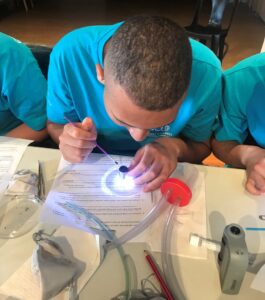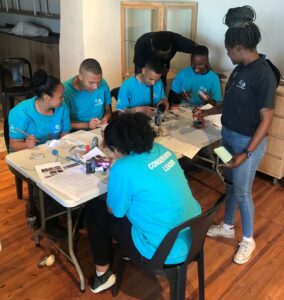On 29 October 2022, the Iimbovane team joined forces with Nature Connect to train a group of budding young conservation leaders as part of their annual Conservation Leadership camp.
The aim of the camp, which took place at the beautiful Bokbaai on the west Coast, is to give the conservation leaders hands-on training in field surveying techniques and expose them to various species, ecosystems, and conservation practices.
Iimbovane gave the leaders a brief overview of ant diversity in South Africa and highlighted some unique and interesting species. Thereafter, the discussion turned to the importance of ants in ecosystems and how ants are used by land managers to monitor the conditions of ecosystems.
The Iimbovane team also showed the leaders how smartphone technology is nowadays being used in research and conservation. Each leader was given a smartphone compatible microscope. After collecting and identifying a few ants around the Bokbaai campsite, the leaders used their microscope-smartphone devices to take photos of the ants and to create their own photo library.
At the end of the camp, the conservation leaders shared their learning experiences as follow:
“What I gained from my camping experience was learning about the ants and the information about the importance that ants play in our ecosystem – especially to our fynbos.”
“I enjoyed the entomology because I never knew all the fascinating things about ants!”
“I learnt how to pin an ant, how to study it under a microscope and how there are different types of ants found all around us.”
“ANTS! What stood out for me was not only getting to know more about ants but the detail about them. We took a closer look at them under the microscope, and I never knew how different they look – also learning about how important they are in our environment was fun.”
The Conservation Leadership Project, an initiative of Nature Connect, involves learners in environmental activities in conservation areas during the last 7 years of their schooling to broaden their views and understanding of conservation and to highlight careers in the environmental sector.
 |

|